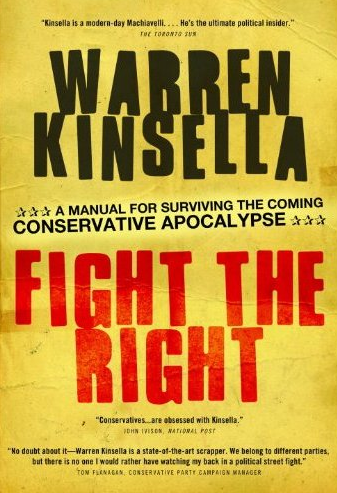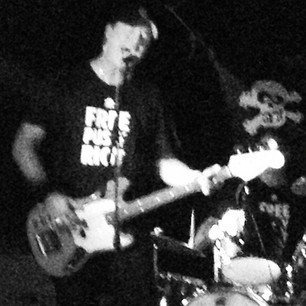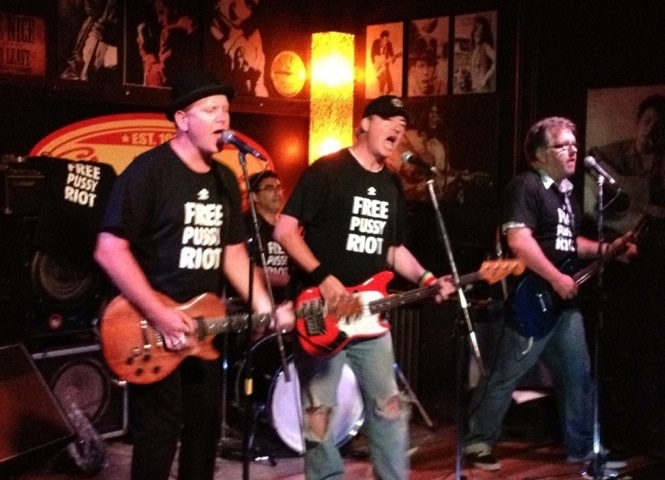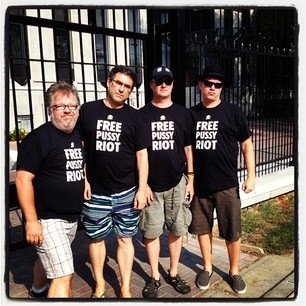Pussy Riot: the band, and the trial, explained
It wasn’t “frustration.” It was hate.
Headlines like this are sloppy and reckless. So too the inane police comments about “we might never know” what motivated the pig who killed innocent people in a place of worship.
He was motivated by hate, for Chrissakes. When he’s quoting the Fourteen Words to everyone (“We must secure the existence of our people and a future for White Children”), his motives shouldn’t be too difficult to ascertain.
Oh, and by the way: ignorance about the motives and methods of the organized hate movement only assists the organized hate movement. Several law enforcement agencies need to get their heads out of their asses, here. They might just prevent some needless deaths, after all.
Not in today’s Sun: this column on politics and religion
[Not sure where it is. In the meantime, here’s what I filed.]
“Where knowledge ends,” British Prime Minister Benjamin Disraeli once opined, “religion begins.”
So what do we know about the religions of Prime Ministers?
Pierre Trudeau was a devout Roman Catholic, and remained so to his dying day. John Turner was (and is) deeply committed to Catholicism, and considered the priesthood in his youth. Paul Martin and Jean Chretien are both Catholics, and both observe the sacraments – although those of us who worked for him recall Chretien occasionally delighting in tweaking the bishops.
The Conservative PMs were religious, too, but not by much. Joe Clark was a faithful Catholic, whilst comparatively progressive on social issues like abortion and gay rights. Similarly, Brian Mulroney – who was a Roman Catholic, and educated at Catholic schools – didn’t pay much heed to the clergy on issues as diverse as abortion or free trade, and didn’t pay a price for it.
Lately, much as been written about Stephen Harper’s faith, although it’s difficult to know why. Much of what has been written about Harper’s religious conviction strikes me as uniformed, unfair, or both.
It is unfair, in the main, because everyone’s personal religious views are just that – personal. Until a politician states that religion will guide his or her decision-making – as Stockwell Day foolishly did in 2000, and as his error-prone B.C. friend Christy Clark did just this week on a Christian television program – it is nobody else’s business.
There is no evidence, none, that Harper favours a comingling of Church and State. In fact, the reverse is true: he recently and mercilessly put down a legislative attempt by one of his own backbenchers to reopen the abortion debate. And, apart from periodically requesting in speeches that God bless Canada, he doesn’t seem like much of a religious fanatic, at all.
For example: I have it on very good authority that Harper and his charming wife were not even married in a church. Nor do the Harpers in any way share the religious fervour of many of their fellow Conservatives, even though Harper himself ostensibly belongs to a Calgary evangelical church. He is infrequently seen there.
So why, then, did the Globe and Mail’s Lawrence Martin recently devote an entire column to Harper’s evangelical faith, and its connection to Conservative government policy? The answer remains elusive. On the one hand, Martin describes the Prime Minister as a “clear-headed rationalist.” Then, on the hand, he “wonders” about Harper’s “impulses.”
An offended National Post’s Charles Lewis then got in on the act, and expressed chagrin that Martin would write about such a subject, and then proceeded to write about it himself. Never missing an opportunity to exaggerate a non-existent threat, the Post likened Martin’s single column to – wait for it – “an Inquisition.” Just, wow.
Then, back at the Globe, a religious broadcaster weighed in, claiming that Harper’s religion was being “probed” (by, er, just Lawrence Martin) and “denominational insiders” (that’s a quote) are “tight-lipped” on the Prime Ministerial faith. Could that be because they, you know, don’t know?
If so, that’s as it should be. If Stephen Harper regards his religion as his own business, the rest of us should mind our own.
(In an possibly unrelated mater, has anyone else noticed that it is Summer, and opinion writers are looking for things to have opinions about?)
Free Pussy Riot!
The official web site. Read up, follow the trial, and donate to their defence.
SFH is getting a banner made up to promote the sale of our FREE PUSSY RIOT T-shirts. All proceeds to their defence. Stay tuned.
Sikh temple shooter a white supremacist (updated)
They’ve been searching his place all night. I won’t be at all surprised if they find the sort of propaganda – Steyn et al. – that inspired Anders Breivik.
Words lead to deeds. It is always thus.
UPDATE: He was a member of a hate rock band, says SPLC.
Toronto tonight: SFH at the Garrison
SFH at Elmdale Tavern in Ottawa tonight, raising money for Pussy Riot
Ottawa: SFH outside Russian embassy
In tomorrow’s Sun: looming disaster – and the only solution
The Quebec provincial election. More than any other provincial issue, that is the one — comme toujours — with the greatest implications for Canada and Canadian politicians. No other provincial concern comes remotely close to the high-stakes contest now underway in the province of Quebec. The outcome will define our national politics for years to come.
Here’s a possible scenario, in 10 problematic steps. It ends with a solution.
One: The remarkable political career of Jean Charest comes to an end, with a loss on Sept. 4 to the separatist Parti Quebecois leader, Pauline Marois. For months, polls have shown Charest is either behind or tied with his PQ rival. If Marois wins a majority in the first week of September, it is difficult to see how Charest can remain at the helm of his party. Federalism will have lost its most effective francophone advocate since Pierre Trudeau and Jean Chretien.
Two: Global, national and sub-national economies will continue to slide. Unemployment will go up, growth will go down. In Quebec, where Stephen Harper is the most detested prime minister in generations, the PQ will do what it has done many times in the past — it will blame far-away anglophone Ottawa for Quebec’s economic woes.
Three: Harper — with precious little caucus representation in Quebec, and even less credibility — will get more unpopular with Quebec voters. His stands on energy, the environment and social programs will continue to rankle progressive Quebecois.




